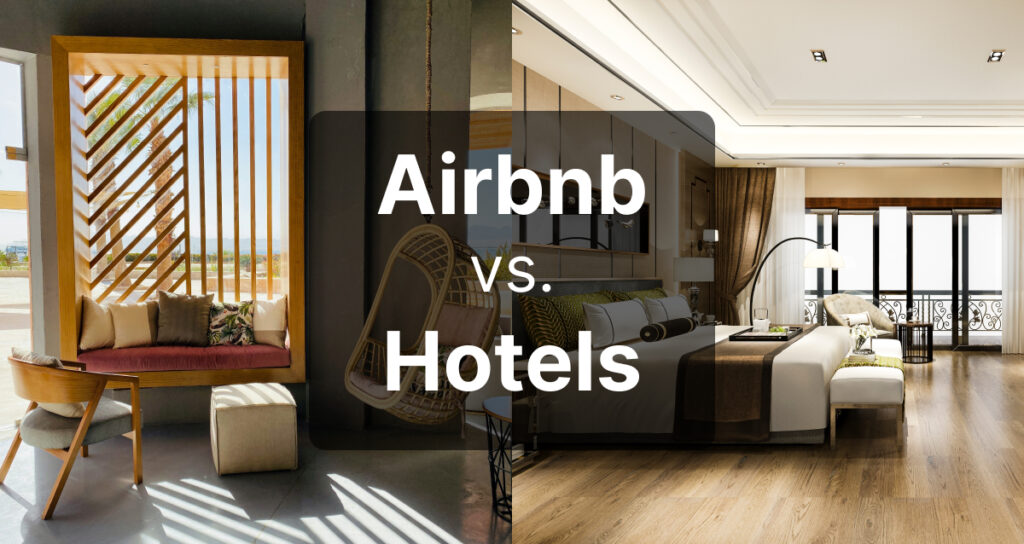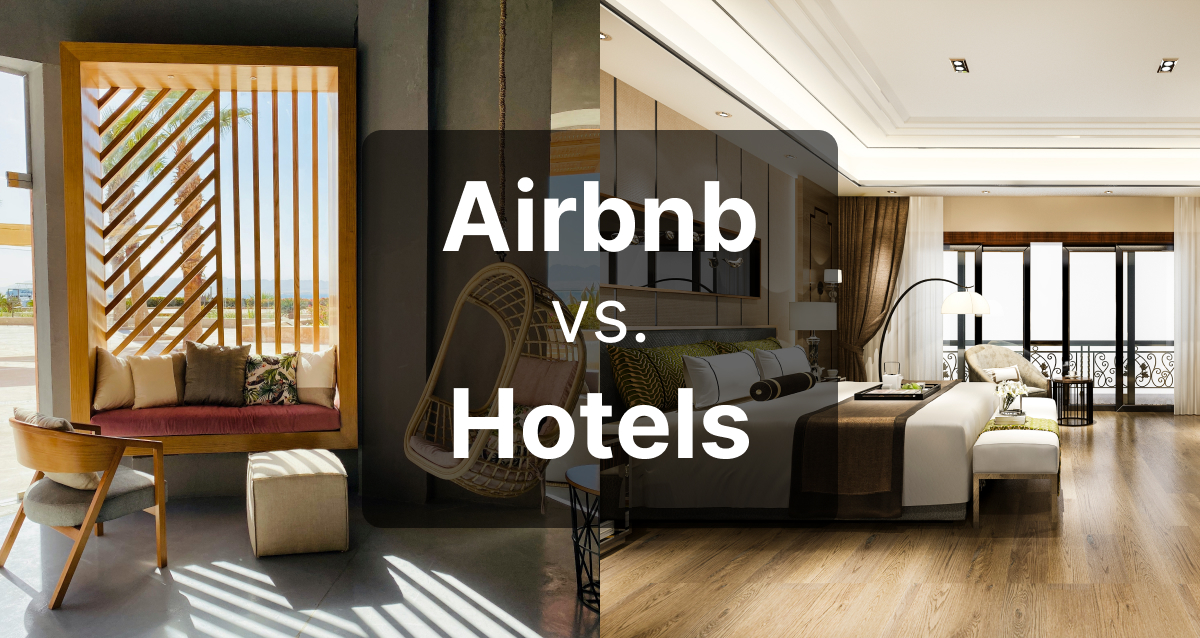
Since its inception in 2008, Airbnb has evolved beyond just a weekend getaway spot, now accommodating business travelers and corporate retreats worldwide. In this blog, we’ll explore the advantages and disadvantages of Airbnb vs hotels. In 2015, 250 companies hopped on board, skyrocketing to over 700,000 within three years, showcasing a growing trend in employee engagement.
Airbnb isn’t shying away from the corporate travel arena. 68% of business travelers prefer hotels over Airbnbs or similar vacation rentals for work trips. In 2018, they rebranded their professional network as Airbnb for Work, aiming to capture the corporate travel market. However, the transition hasn’t been seamless.
Understanding the Comparison of Airbnb Vs Hotel
For business travelers seeking efficiency, Airbnb’s “For Work” filter attempts to offer suitable options, but it often falls short. Despite efforts like one-click expensing simplifying reimbursement, the platform lacks the reliability and convenience business travelers crave.
On the plus side, Airbnb excels in affordability, typically 40% cheaper rentals than hotels. This makes it an attractive choice for extended stays or relocating employees. Many listings also offer amenities like kitchens and washing machines, catering to budget-conscious corporate travelers.
For companies planning retreats, Airbnb allows renting entire homes with designated workspaces, fostering a blend of productivity and comfort. To cater to business travelers, Airbnb encourages hosts to provide daily housekeeping, amenities, and improved service levels.
However, hotels still hold certain advantages. Quality assurance is one – while Airbnb has filters like ‘super host,’ guaranteeing top notch quality on-site is challenging. Hotels also win on location, being more conveniently situated for business-related activities.
Booking convenience is another area where hotels shine. Airbnb only covers accommodation and a few experiences, requiring additional platforms for complete itineraries. This complicates invoicing and compliance tracking, which has to be streamlined through TMCs like ITILITE.
Hotels also offer hotel loyalty programs, accumulating points for perks of Airbnb vs hotel, while Airbnb lacks a rewards system. This can be a severe disadvantage for frequent travelers as hotel flexibility became crucial during the pandemic, especially for loyalty club members with generous cancellation policies.
Safety is another concern. Hotels provide security features like safes and on-site staff, with many corporate travel policies offering insurance. While making strides in safety checks, Airbnb may not provide the same level of security, relying heavily on user community vigilance.
Suggested Read: 4 Sustainable Business Travel Hotel Chains
Making the Right Choice for Your Travel Needs
In travel accommodations, two options stand out: Airbnb and hotels. Each offers unique advantages and disadvantages, making travelers need to weigh their options carefully. Let’s find out the pros and cons of Airbnb to help you make an informed decision for your next trip.
Airbnb Vs Hotel Pros and Cons
What are the Pros of Airbnb?
- Home-like Experience: One of the most significant advantages of Airbnb is the opportunity to stay in a home-like environment. Whether it’s a cozy apartment, a charming cottage, or a spacious villa, Airbnb properties often provide a more personalized and comfortable experience than hotels.
- Cost-Effectiveness: Airbnb accommodations can be more budget-friendly, especially for travelers looking for long-term stays or larger group accommodations. With options ranging from shared rooms to entire homes, Airbnb allows travelers to find accommodations that suit their budget and preferences.
- Local Immersion: Staying in an Airbnb property immerses travelers in the local culture and community. Hosts often provide insider tips on the best local restaurants, attractions, and hidden gems, giving guests a more authentic travel experience.
Let’s Find Out the Cons of Airbnb
- Lack of Consistency: While Airbnb offers a diverse range of accommodations, the quality and consistency can vary significantly from one property to another. Guests may encounter issues such as cleanliness standards, amenities, and communication with hosts, leading to potential inconsistencies in their experience.
- Limited Services: Unlike hotels, Airbnb properties may need more amenities and services commonly found in traditional accommodations, such as room service, concierge assistance, and daily housekeeping. After exploring Airbnb vs hotel pros and cons, travelers who prioritize convenience and on-site amenities may find Airbnb less suitable.
- No longer a Cheaper Option: Does anyone else feel like Airbnb prices have gone through the roof? Well, they’re right. Airbnb’s sticker shock is real. Nightly rates have climbed, and hidden fees can pack a punch. Not only are the base prices higher, but the additional fees can be brutal. Between Airbnb’s service fees, cleaning charges set by hosts, and local taxes and fees, the final cost can quickly balloon to double what you see listed at first glance.
What About Hotels?
Pros of Hotel
- Professional Services: Hotels offer professional services and amenities to enhance the guest experience. From 24/7 reception and concierge services to daily housekeeping and on-site dining options, hotels provide a high level of convenience and comfort for travelers.
- Consistency and Standards: One of the critical advantages of hotels is their consistency and adherence to quality standards. Whether staying at a luxury resort or a budget-friendly hotel chain, you can expect a certain level of service, cleanliness, and amenities across all properties.
- On-Site Facilities: Hotels often feature a wide range of on-site facilities, including fitness centers, swimming pools, business centers, and meeting rooms, catering to the diverse needs of travelers. These amenities add value and convenience to the overall hotel experience.
Suggested Read: How to Choose the Right Business Travel Accommodation for Travelers?
Cons of Hotel
- Less Personalized Experience: Unlike Airbnb, hotels may need a more personalized touch and homely atmosphere than some travelers prefer. The standardized nature of hotel accommodations can sometimes feel impersonal, especially for those seeking a more intimate and authentic experience.
- Higher Costs: Hotels, especially those in prime locations or with luxury amenities, can be more expensive than Airbnb accommodations. Travelers on a tight budget may find hotels less cost-effective, particularly for more extended stays or group travel.
- Lack of Privacy: Heads up! Hotel security cameras are more common than you think, and the walls might be thinner than you’d like. Besides, online reviews and photos sometimes paint only part of the picture. The real experience can be a real gamble until you check-in.
Summary
There is no one-size-fits-all answer when choosing between Airbnb and hotels for your next business travel or vacation. Each option has its pros and cons of Airbnb vs hotel, and the best choice depends on your preferences, budget, and travel needs.
If you value personalized experiences, local immersion, and cost effectiveness for corporate travel management, Airbnb may be your ideal choice. On the other hand, after analyzing Airbnb vs hotel pros and cons, hotels better suit your preferences if you prioritize professional services, consistency, and on-site amenities.
Ultimately, in business travel management, whether you opt for Airbnb or hotels, the key is to conduct thorough research, read reviews, and consider your specific requirements to ensure a comfortable and enjoyable stay. Airbnb offers cost-effective and flexible options for business travelers, typically larger groups, but hotels still dominate in quality assurance, convenience, loyalty programs, and safety features. If you are a travel manager weighing these options for your program, I’d say it depends on priorities and the nature of the trip.
By understanding the comparison of Airbnb vs. hotels, you can make an informed decision that aligns with your travel preferences and priorities.
Tell us about your business travel challenges. We can streamline your corporate travel experience. Let’s talk!
















 and then
and then